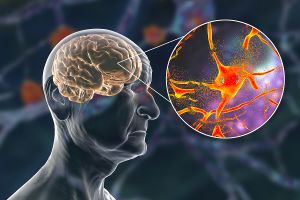 A new study published in the Journal of Neurobiology of Disease looked at organelle dysfunction in human astrocytes in Alzheimer’s Disease.
A new study published in the Journal of Neurobiology of Disease looked at organelle dysfunction in human astrocytes in Alzheimer’s Disease.
“We have analyzed transcriptomic data (gene-expression data) from almost 800 patients with Alzheimer’s disease and controls to look for molecular signatures of astrocytes, a type of brain cell. Transcriptomes contain information about the cell genome, over 30,000 genes,” study author Elena Galea told us. “The analysis of transcriptomes is very useful because when a cell is perturbed during a disease, it shows in the transcriptome.
Transcriptomes are like fingerprints. Transcriptomes can be used to infer functional changes in cells.
“The beauty of transcriptomic analysis is that it is unbiased,” Galea told us. “One does not know what is going find.”
The purpose of transcriptomic analysis is precisely to elaborate hypothesis about what happens in a given cell type and a given disease. Based upon these hypotheses researchers can elaborate predictions about phenomena that can be tested in experiments using animal and cellular models.
“We chose to do this study because our line of research is astrocytes and there was some circumstantial evidence in the scientific literature that made us think that something was going on in astrocytes in Alzheimer's disease,” Galea told us. “We did not have a theory and we did not test anything. The study is purely analytical.”
There were two main results. First, researchers observed a deep change in the transcriptomes of astrocytes and neurons. Neurons were the positive control, because the changes of neuronal trancriptomes are well characterized, particularly the decrease in expression of synaptic genes that explains why neurons communicate poorly in Alzheimer’s disease.
“In astrocytes, we found a decrease in the genes encoding mitochondrial and lysosomal proteins. Mitochondria produce energy and the lysosomes digest cellular debris,” Galea told us. “The decrease in their respective genes points to impairment of those functions in astrocytes. In the study we put together a model to explain how astrocyte dysfunction may contribute to neuronal dysfunction.”
The subjects were highly heterogeneous in their genetic profiles. Researchers could detect this precisely because they used many patients (this is an asset of the study). There were controls that looked like Alzheimer patients and vice versa.
“We were surprised by the results,” Galea told us. “Particularly the patient heterogeneity and the negative correlation between mitochondrial dysfunction is astrocytes and disease stages, suggesting a close relationship between astrocyte energetic dysfunction and the progression of pathology.”
Galea and researchers now want to test in animal models whether the lysosomal and mitochondrial systems are really impaired in astrocytes and obtain proof of concept that reversal of those dysfunctions is beneficial with respect to pathological hallmarks and behavior.
“In parallel, we want to look for molecular biomarkers of mitochondrial and lysosomal dysfunction in astrocytes in fluids of patients, particularly in those at very early stages of the disease,” Galea told us. “If we find them, it means that our prediction about the implication of astrocytes in Alzheimer’ disease may be correct. If both the studies in mice and human fluids give positive data, we will start developing disease-modifying therapies targeted to astrocytes.”
Patricia Tomasi is a mom, maternal mental health advocate, journalist, and speaker. She writes regularly for the Huffington Post Canada, focusing primarily on maternal mental health after suffering from severe postpartum anxiety twice. You can find her Huffington Post biography here. Patricia is also a Patient Expert Advisor for the North American-based, Maternal Mental Health Research Collective and is the founder of the online peer support group - Facebook Postpartum Depression & Anxiety Support Group - with over 1500 members worldwide. Blog: www.patriciatomasiblog.wordpress.com
Email: tomasi.patricia@gmail.com